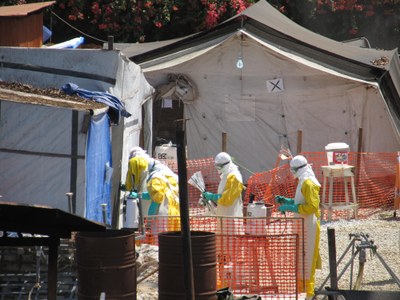Asking the Right Questions Post-Ebola
 The recent Ebola outbreak in West Africa exposed the weaknesses of national health systems in general, and health information systems in particular, and served as a wake-up call to strengthen mechanisms for timely, reliable information management and sharing regarding epidemic-prone diseases within and between countries.
The recent Ebola outbreak in West Africa exposed the weaknesses of national health systems in general, and health information systems in particular, and served as a wake-up call to strengthen mechanisms for timely, reliable information management and sharing regarding epidemic-prone diseases within and between countries.
A properly functioning health information system supports a country’s ability to respond to health emergencies by getting information into the right hands when needed, and enabling policymakers, managers, and health care providers to make informed choices from patient care to allocating national budgets – yet health information systems in many countries are weak, and often disease surveillance and response systems are not integrated with routine health information systems, impeding information sharing during crises.
Three new articles examine the Ebola outbreak and health systems in a larger context, two considering evidence of how routine health care fared during the epidemic and the third asking the right questions about what ought to be happening in public health planning post-epidemic, focusing on ethical considerations for all countries.
Guinea was ground zero for the 2014 outbreak and suffered a mortality rate higher than the other two countries also severely affected: Sierra Leone and Liberia. Experts were concerned that other health issues such as malaria, pneumonia, and typhoid, as well as routine care for maternal and child health, might suffer due to clinic closures, patients afraid to visit facilities for fear of contracting Ebola, or patients with Ebola‐like symptoms being turned away. MEASURE Evaluation conducted a rapid assessment in Guinea to see the effects of Ebola on routine reproductive, maternal, newborn, and child health (RMNCH) services. The authors’ findings are now described in a report and in a related journal article in PLOS Currents.
Separately, “Ebola: The Ethics of Thinking Ahead,” published in the current issue of Journal of Public Health Management & Practice, proposes that ethics are an essential element of public health and health information systems and should be codified before the next crisis. Lead author Jim Thomas, MEASURE Evaluation Project Director, suggests if we don’t do so now, we set up ethical lapses in care and treatment of the sick, which in itself would be unethical. “We suggest that preventing foreseeable ethical lapses is as important as preventing foreseeable adverse health outcomes,” the authors write, offering examples from Ebola and Avian influenza outbreaks.
This article is reprinted from Science Speaks.












